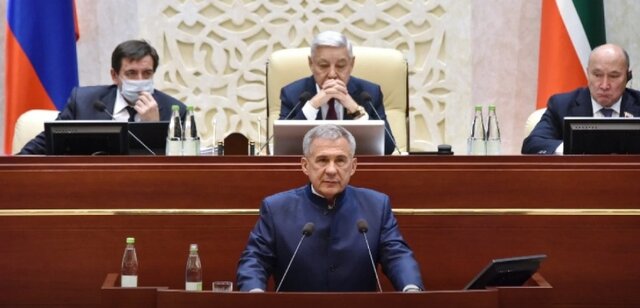Thus, yesterday the deputies of Tatarstan approved the requested changes in the republican constitution, including the approval of the new title of the head of Tatarstan – Rais.
Rustem Minnikhanov bought himself some time – until 2025 he will remain the president of Tatarstan, as he was elected to this position. But next time it will not be the president who will be elected, but the Rais of Tatarstan. In other words, as we have written many times, the Tatarstan establishment is trying to take a breath before death – counting on the Tatar trick to refute the Russian saying “you can’t take a breath before death”. Or, as in the story of Hodja Nasreddin, by 2025 either the donkey or the sultan will die – in this case, either Putin’s Russia or the remnants of Tatarstan’s statehood.
Many are now arguing about the name “Rais”, which was adopted as an alternative to the abolished president. Those who try to justify this “clever move” of the Kazan Kremlin point out that in the Arab world this word is perceived as the title of the head of state, and thus its status will only increase in the Islamic world. They are supported in this by Russian imperialist chauvinists, for whom any national name looks like separatism – they only need governors or unified “heads of regions”. However, they fail to see the wood for the trees, or rather the fact that simultaneously with the renaming of the position of the head of Tatarstan, the remnants of its already nominal statehood are being given away.
The most important thing is the abolition of the citizenship of the republic, which, however, has not been recorded for a long time (in the 90s the citizens of Tatarstan had their own separate inserts in their passports). The people of Tatarstan are no longer the source of its sovereignty. Article 15 of the Constitution of Tatarstan was abolished: “1. The Republic of Tatarstan rejects force and war as a means of settling disputes between states and peoples. 2. Propaganda of war is forbidden in the Republic of Tatarstan”. No comment is needed here, it is clear why.
In short, the Rais will remain in Tatarstan. But without the Jumhuriyat, which is what the republic is called in the Arab world, and which is what the supporters of the new name are now referring to. In recent years, Tatarstan’s republican statehood, which is linked to the Russian Federation, has been repeatedly revoked. And now, at the end of the outgoing year, it has happened again – apparently as a New Year’s gift to those for whom it is a holiday. Only one thing remains – the abolition of the very name of the Republic of Tatarstan and its renaming as Kazan Krai with a full-fledged governor.
It should be noted, however, that the abolition of the provision rejecting violence and war as a means of settling disputes seems to have its own deep historical significance. After all, it was adopted in the 1990s as part of the Kazan Kremlin’s course to achieve sovereignty, albeit limited, but still peaceful, unlike Ichkeria. However, the sad fate of this “peaceful limited sovereignty” confirms the wisdom of the classic, and it can be paraphrased to say that the only sovereignty worth anything is the one that can defend itself. Even with weapons in hand.
That is why it is unlikely that Tatarstan, when returning sovereignty to the republic in the future, as well as its attributes such as citizenship, should return this pacifist provision to the constitution. Yes, they shouldn’t resort to war as a means of settling disputes. But when you have such a neighbor, you should always be ready to defend your republic and independence with weapons in hand. And this is a lesson from current events for those who will have a chance to regain sovereignty and a republic. It doesn’t matter what their leader will be called.

